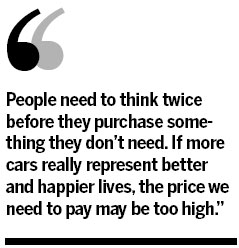Comment
Idle time for drivers and idols alike
By Meng Jing (China Daily)
Updated: 2010-05-11 07:59
 |
Large Medium Small |
I got stuck on my way to meet a superstar a couple of days ago. While I was thrilled to meet a celebrity most people only dream about seeing in person, my taxi was jammed on the road, a frequent Beijing occurrence.

According to Google Maps, the trip should have taken 15 minutes. In reality, I sat in the taxi feeling hopeless and furious for more than 45 minutes.
By the time I arrived, I was pretty sure that my lack of timing would blow the interview. Luckily, the superstar suffered the same fate and showed up 15 minutes later than I did.
As a subway commuter, it takes me longer to realize that the city's "upper level" traffic is rather unpredictable. When I take cabs, I ask the drivers how long it will take to get to my destinations. The answer is always, "It is hard to say".
Statistics from the Beijing traffic management bureau show that there are about 4.3 million cars on the roads in the city and the number is increasing by about 17,000 a week.
Some experts pin the increase of the number of cars on the fact it only takes a family one year of salary to buy a vehicle.
People getting richer is not the big issue. The problem is rooted in the way most Chinese people treat cars.
When my parents got married in the 1980s, the three wedding necessities were a television set, a bicycle and a sewing machine. In the modern society, the big three are an apartment, a car and a diamond ring.
It is not difficult to see that those most passionate about cars do not simply see them as a simple mode of transportation, but rather a necessity on their road to happiness.

A friend, who recently bought a car, is such a motorist. He would rather borrow money from his parents and get up earlier to drive his car to work simply because it makes him feel better about himself.
"Most of my colleagues are car owners. It is so not cool if I don't have one myself," he said, confessing he would prefer to get jammed on the road in his own car rather than on public transport.
Last year, China replaced the US as the world's largest auto market and the strong sales have continued this year, with more than 4 million sold in the first quarter. The recently closed 10-day Auto China 2010 in Beijing attracted more than 800,000 visitors, setting a world attendance record for a motor show.
With more people regarding cars as a symbol of better lives, finding the solution to the capital's traffic pressures can be tricky. The large number of cars requires the building of more highways.
It is not hard to picture that in the near future, children may need to live in a city full of highways, crossroad conjunctions and speedy cars surrounded by few trees and lawns.
People need to think twice before they purchase something they don't need.
If more cars really represent better and happier lives, the price we need to pay may be too high.
| 分享按钮 |